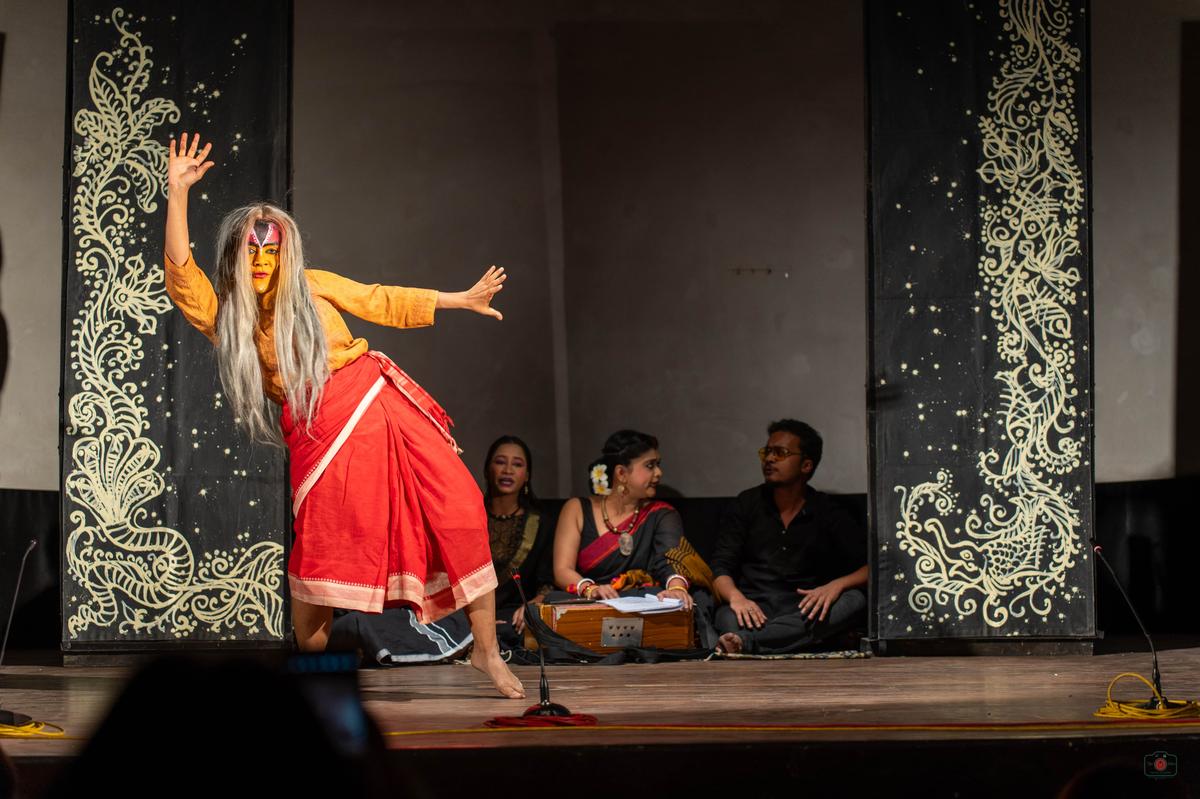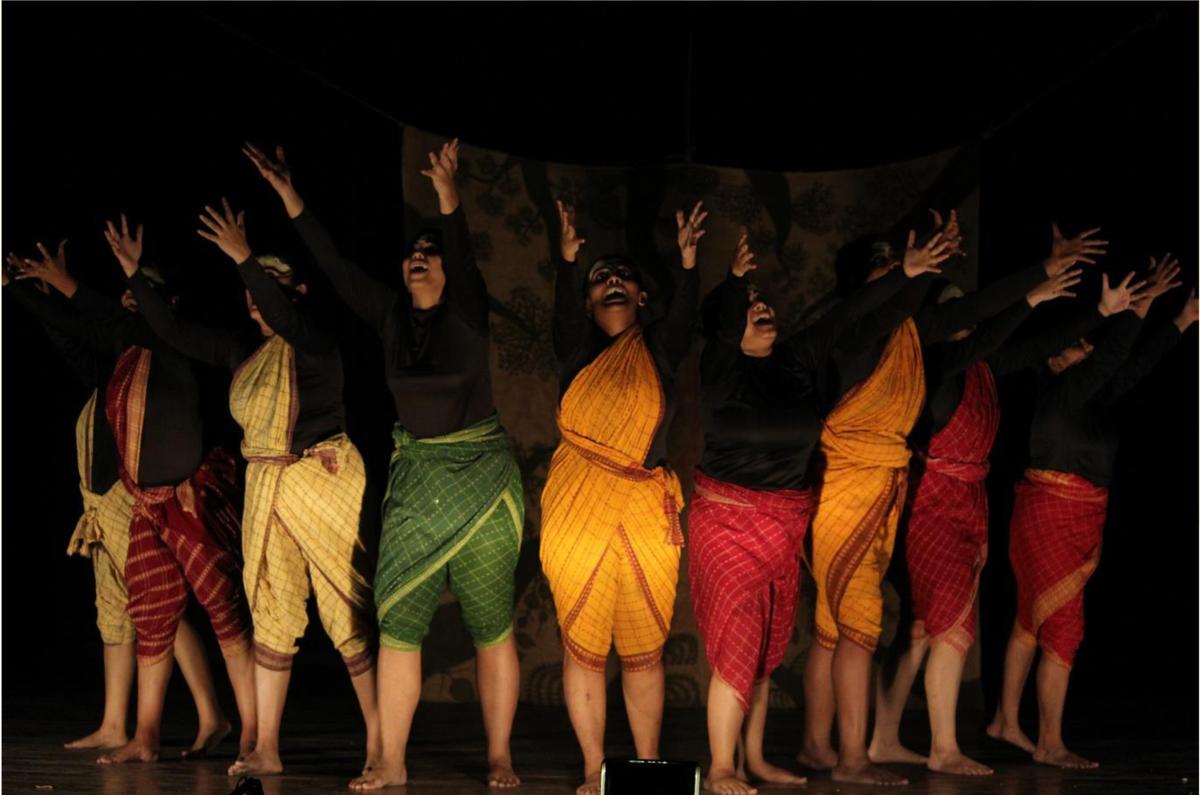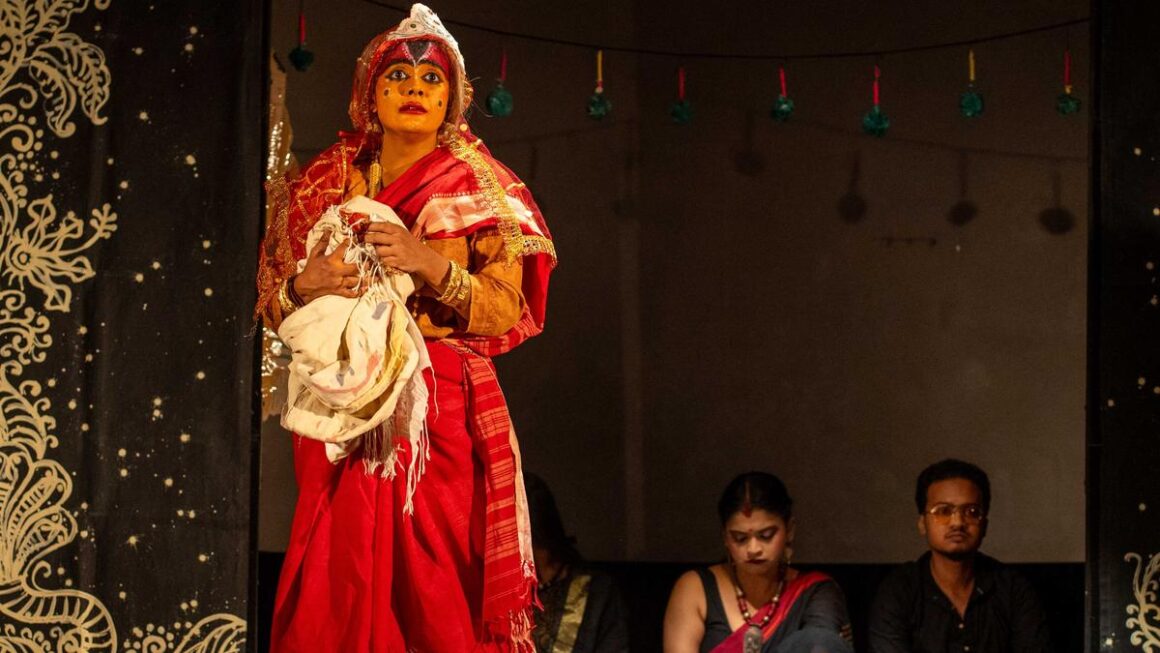
Still from ‘Bhasaili Re…’
| Photo Credit: Special Arrangement
Birati Samuho Performers Collective, a Kolkata-based troupe that aims to redefine folk narratives with modern sensibilities, brings two mythological tales to Bengaluru, each told from the perspective of its often-sidelined female protagonists. With Atho Hidimba Kotha and Bhasaili Re…, audiences will get to hear the unfiltered voices of Hidimba, a fierce tribal woman from the Mahabharata, and Behula, a devoted wife from Bengal’s mediaeval lore. Through these feminist retellings, the collective reclaims stories of survival, strength, and rebellion — stories that, despite their ancient origins, strike a chord in today’s world.
“A lot of these narratives are rooted in traumatic oppression but also hold stories of survival and alternative possibilities,” says Titas Dutta, founder and director of Birati Samuho. For Titas, who brings more than a decade of theatre-making experience, Atho Hidimba Kotha offers a rare perspective on the Mahabharata by centering on Hidimba, a character often relegated to the margins. In contrast, Bhasaili Re… allows Behula from the mediaeval Bengali saga Manasa Mangal Kavya to reflect on her journey through a modern, feminist lens.

Still from ‘Bhasaili Re…’
| Photo Credit:
Special Arrangement
These plays are more than reinterpretations, according to Titas. They act as mirrors, reflecting contemporary societal struggles by challenging deeply rooted, often limiting traditions. They are also intentionally crafted in Bengali, staying close to the cultural rhythms of rural Bengal while keeping the performance portable to make the experience accessible across social and economic divides.
Titas’s journey to Atho Hidimba Kotha began with a seemingly unrelated event — a comment by an Indian political figure suggesting that when women take on traditionally “masculine” responsibilities, they adopt “rakshasa guna” (demonic qualities). Intrigued by this label and its gendered implications, Titas felt drawn to Hidimba’s story as an “Indigenous woman, single parent, and provider,” whose strengths are shadowed by a “patriarchy” that left her role minimised in the Mahabharata.
“Looking at history, I feel the same about female and queer narratives in this country,” she observes. “The marginalised are rarely acknowledged. Atho Hidimba Kotha inverts the typical perspective, allowing Hidimba’s voice to shape the story.”
Birati Samuho’s second production in the lineup, Bhasaili Re…, tells a tale that, while rooted in folklore, resonates with today’s audiences. This solo performance depicts Behula, traditionally seen as an ideal wife, as a complex individual questioning her life’s trajectory. Under Dutta’s mentorship, Bhasaili Re… embraces a collaborative storytelling style, integrating elements from the Indian folk theatre traditions of Tamasha, Nautanki, and Jatra to engage and challenge audiences.

Still from ‘Atho Hidimba Kotha’
| Photo Credit:
Special Arrangement
“Audiences complete our work,” Titas says. “Our theatre is an intellectual interaction with them — one where satire, parody, and accessible language allow us to make strong social critiques. In Bhasaili Re…, for instance, the focus is on the contrast between Behula’s experience and societal expectations placed on women.”
As a theatre maker identifying as queer, Titas uses her platform to explore themes of gender identity and societal marginalisation — a reflection of her personal journey after training at the London International School of Performing Arts. Yet, she insists that her work is a group effort, emphasising that the Samuho team is central to transforming these heavy themes into something “vivacious and audacious.”
With Birati Samuho’s first showcase in Bengaluru, Titas is already looking forward to future exchanges with the city’s creative circles. “We hope to return, not just to perform but to collaborate, engage in conversations, and explore shared visions with other collectives and audiences here,” she says.
The troupe will stage Atho Hidimba Kotha on November 8 at Ranga Shankara’s 20th festival in JP Nagar, while Bhasaili Re… will have two performances: November 7 at Courtyard Koota in Kengeri and November 9 at Beru Art Space in Ramamurthy Nagar.
Published – November 06, 2024 12:40 pm IST


Leave a Reply